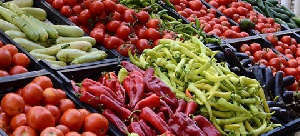Ghana’s import of consumer-oriented food products between January and July this year have leapt to US$817million, the United States Department of Agriculture (USDA) has said.
This is almost 13 percent – US$104million – more compared to the same period last year.
Ghana, according to the USDA, is an importer of consumer-oriented food and agricultural products. These imports support local processors and nourish consumers.
Last year, the country’s consumer-oriented imports reached US$1.36billion, with import of U.S consumer-oriented products reaching US$86million, up 3 percent compared to 2022.
This makes the United States Ghana’s fourth largest supplier of consumer-oriented food products.
Indeed, the European Union (EU) and China remain U.S suppliers’ main competitors. The EU, the USDA said, has been the country’s largest supplier of consumer-oriented products – representing 31 percent of the market – followed by China (25 percent).
The EU’s key exports to the Ghanaian market include poultry, dairy products and several other essential imports.
However, the USDA is optimistic that imports of U.S origin food products are experiencing even stronger growth of 37 percent, coming in at over US$65million compared to the US$47million registered in 2023.
Ghana, like many other developing nations, relies heavily on import of food and consumer goods to feed its population. For instance, the country imports 55 percent of the rice that it consumes.
The country’s import dependence is primarily a consequence of the production of low-value primary products without substantial value addition.
To forestall over-dependence on foreign goods, the government – at a point – proposed a trade restrictive policy via a legislative instrument on 22 major items.
It justified the policy on the grounds that it wants to reduce Ghana’s dependence on foreign goods by making locally produced goods more attractive from a price perspective. In turn, the idea is that this will drive up domestic production.
The list of items includes rice, offal, poultry, cooking oil, fruit juices, noodles and pasta, fish, sugar and canned tomatoes. All are commonly consumed in most Ghanaian households.
However, stakeholders believe imposing constraints on these food items have the potential to escalate prices.
Restricting imports without ensuring high-quality and competitive domestic products will not lead to consumer preference for locally made goods.
Watch as Ghanaians share their emotions on John Mahama's presidential win
Business News of Wednesday, 11 December 2024
Source: thebftonline.com

















